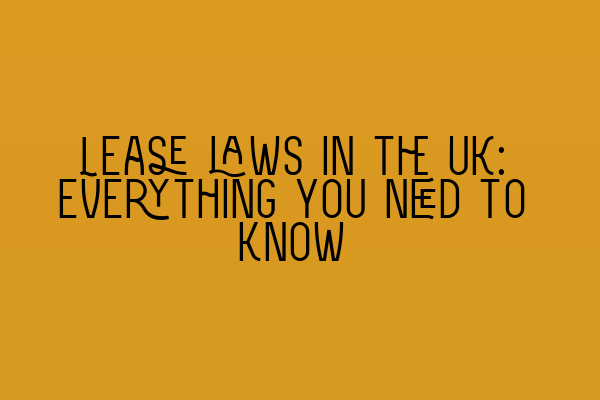**Lease Laws in the UK: Everything You Need to Know**
Are you a landlord or a tenant in the UK? Do you fully understand the lease laws that govern your lease agreement? Leases can be complex legal documents, and it’s crucial to have a clear understanding of your rights and obligations under the law. In this blog post, we will cover everything you need to know about lease laws in the UK, from the basics to more intricate details.
**What is a Lease?**
Before diving into lease laws, let’s start with the basics. A lease is a legal agreement between a landlord (also known as the lessor) and a tenant (also known as the lessee). It establishes the terms and conditions under which a property is rented out, including the duration of the lease, rent payment details, and any obligations that both parties must adhere to.
**Types of Leases**
There are two main types of leases in the UK: fixed-term leases and periodic leases.
* **Fixed-Term Leases**: A fixed-term lease is a lease agreement that has a specific start and end date. It provides both the landlord and the tenant with a level of certainty regarding the duration of the lease. Upon expiration of the fixed term, the lease can either be renewed or terminated.
* **Periodic Leases**: A periodic lease, on the other hand, is a lease agreement that continues indefinitely. It does not have a specified end date and continues until either the tenant or the landlord gives notice to terminate the lease. Periodic leases are commonly referred to as month-to-month or rolling leases.
**Rights and Obligations of the Landlord**
As a landlord, you have certain rights and obligations that you must fulfill under lease laws in the UK. Some of these include:
1. **Right to receive rent**: Your tenant is obligated to pay rent on time as specified in the lease agreement. Failure to pay rent is a breach of the lease, which may lead to eviction proceedings.
2. **Right to enter the property**: As a landlord, you have the right to enter the rental property for necessary inspections or repairs. However, you must provide your tenant with reasonable notice, usually 24 to 48 hours, before entering the premises.
3. **Obligation to maintain the property**: It is the landlord’s responsibility to ensure that the property is safe and habitable. This includes addressing any repairs or maintenance issues promptly.
For a more comprehensive guide on the rights and obligations of landlords in the UK, check out this [SQE Property Law & Land Law article](https://fqps.co.uk/sqe/sqe1-preparation/practice-mocks-quiz).
**Rights and Obligations of the Tenant**
As a tenant, you also have certain rights and obligations under lease laws. It’s essential to understand these to protect yourself and ensure a smooth tenancy. Here are a few key points:
1. **Right to quiet enjoyment**: The tenant has the right to enjoy the property without interference from the landlord. This means the landlord cannot enter the property without proper notice or harass the tenant.
2. **Obligation to pay rent**: The tenant must pay the agreed-upon rent on time and in full. Failure to do so may result in eviction proceedings.
3. **Obligation to maintain the property**: While the overall responsibility for property maintenance lies with the landlord, tenants must keep the property clean and report any maintenance issues promptly.
To learn more about the rights and obligations of tenants in the UK, you can read the full article on [SQE Property Law & Land Law](https://fqps.co.uk/sqe/sqe1-sqe2-exam-dates).
**Termination of a Lease**
Leases can come to an end through several means. The most common ways include:
1. **Expiration**: A fixed-term lease comes to an end when the agreed-upon duration is up, unless the lease is renewed.
2. **Mutual agreement**: The tenant and the landlord can agree to terminate the lease early by signing a termination agreement. This should be done in writing and signed by both parties.
3. **Notice to quit**: In the case of a periodic lease, either the tenant or the landlord must provide notice to terminate the lease. The length of the notice period may vary depending on the terms of the lease.
For more information on terminating a lease in the UK, consult this [SQE Property Law & Land Law article](https://fqps.co.uk/sqe/sqe2-preparation).
**Seek Legal Advice**
Lease laws in the UK can be complex, and it’s always a good idea to seek legal advice when entering into or dealing with lease agreements. An experienced solicitor can guide you through the process, ensuring that your lease agreement is legally sound and that your rights are protected.
At SQE Property Law & Land Law, we offer expert legal services for all your property law needs. Whether you need assistance with lease agreements, landlord-tenant disputes, or any other property-related matters, our dedicated team of solicitors is here to help.
For more information on our services or to book a consultation, visit our website and explore our range of [SQE Preparation Courses](https://fqps.co.uk/sqe/sqe1-preparation) and [SRA SQE Exam Dates](https://fqps.co.uk/sqe/sqe1-sqe2-exam-dates).
**Conclusion**
Lease laws in the UK play a vital role in protecting both landlords and tenants. Understanding your rights and obligations is crucial for a successful and harmonious tenancy. Whether you are a landlord or a tenant, it’s always wise to seek legal advice and ensure that your lease agreement is in compliance with the law.
For any legal assistance with lease laws or property-related matters, don’t hesitate to reach out to SQE Property Law & Land Law. Our team of experts is ready to provide you with top-notch legal services and guide you through the complexities of lease laws in the UK.
